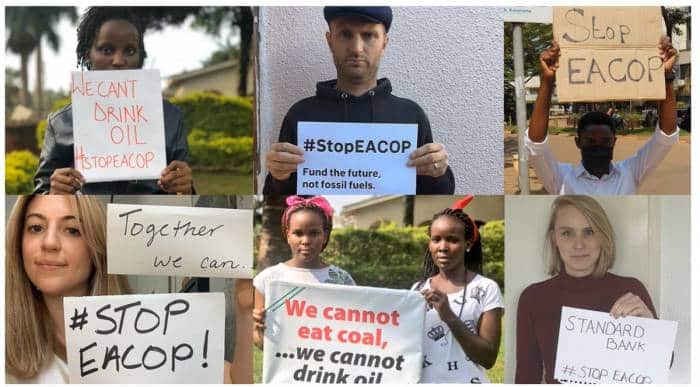When the East African Crude Oil Pipeline (EACOP) was first conceptualized in 2016, communities across Uganda and Tanzania were skeptical. It would destroy significant farmlands, for one, and risk the water supply for upwards of 40 million people.
But as the EACOP project progressed under French oil giant TotalEnergies, and its devastating scope became clear — from the impact of more fossil fuels on our heating climate, to the growing number of families losing their homes without compensation — that skepticism turned to anger and resistance. The #StopEACOP coalition was born.
Now, with pipeline construction still delayed and a real opportunity to end the project for good, the fight to stop the world’s longest heated crude oil pipeline has gone global.

Activists across the world participating in a #StopEACOP selfie action.
Led by and in support of the African activists who regularly put their safety on the line to stop EACOP, civil society around the world has turned up the pressure on TotalEnergies as well as the almost-exclusively Global North financiers backing the project — and it’s starting to work. In the last few months alone:
- Nine student activists were arrested in Uganda for protesting the pipeline earlier this month. Far from the arrests going unseen, hundreds of civil society organizations (CSOs) around the world rallied behind the students and shone a spotlight on this and other human rights violations.
- Italy’s largest bank, Intesa Sanpaolo, ruled out financing for EACOP. This brings the total count of banks who’ve either ruled the project out or pulled their funding to 24, while 18 insurers have turned down the project — and several of these financiers directly cite environmental and/or social risks in their reasoning.
- Over 100 CSOs called out the Islamic Development Bank (IsDB) after the bank announced a $100M loan for EACOP, because an oil pipeline that destroys Ugandan agriculture and fisheries sectors (not to mention worsen the already-disastrous impacts of global heating on the region) will do the opposite of boost the local economy.
- The European Union passed an emergency resolution against human rights violations and environmental threats linked to EACOP, highlighting the pipeline’s disastrous consequences as well as denouncing the threats and intimidation that human rights defenders have faced, and urging Total and their backers to focus on renewable energy projects instead.
Amid all this momentum against the EACOP project, Africa is also readying itself to host COP27 in Egypt. For the first time in international climate conference history, African civil society will take the main stage in defining what a just, clean energy future could look like — which means now is our chance to show TotalEnergies and EACOP’s remaining backers that the world is on Africa’s side, starting by stopping this pipeline for good.
Join us for a week of global online actions against EACOP to show your solidarity, apply pressure on those who still want to make this pipeline happen, and help the #StopEACOP coalition enter COP27 with as loud a voice as possible.
The post Momentum Against EACOP Grows — Help Us Keep It Going! appeared first on 350.


0 Commentaires